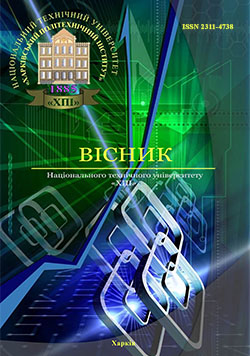DEVELOPMENT OF A MODEL REPRESENTATION OF COMPETENCIES IN EDUCATION PROJECT
DOI:
https://doi.org/10.20998/2413-3000.2016.1173.12Keywords:
projects, training model, knowledge, competence, competence matrixAbstract
Value orientation of education is to expand its accessibility and the creation of a system of continuous education in the form of automated learning systems. A solution of the problem of individualization of learning is only possible in the case of competence approach allows you to structure the courses in the form of a minimum set of educational elements that form the basic knowledge and skills of students. To form the competencies necessary to make a set of disciplines, with mandatory release of interdisciplinary connections. Formation of competencies takes place on the basis of not only the relationship between the disciplines, and the general knowledge of the subject area. The paper deals with the structural model of relations between the competencies of the national standard in Ukraine. It is shown that the relationship between the competencies objectively exist and can be used for the formation of a set of competencies for which all the elements are interconnected and thus form a set of interrelated elements - the core of competencies.References
Atanov G., & Pustynnikova I. (2004). Education and artificial intelligence, or the foundations of modern didactics of the higher school. Donetsk: Publishing House DOW, 504 [in Russian].
Oborskyy G., Gogunsky V., & Saveliev A. (2011). Standardization and certification processes of quality management education in higher education. Odes. polytechnic University. Pratsi, 1 (35), 251-255 [in Ukrainian].
Kolesnikov A. E. (2014). Formation of the information environment of the University for distance learning. Management of complex systems, 20, 21-26 [in Russian].
Learning services for non-formal education and training – Basic requirements for service providers. ISO / DIS 29990 : 2010, (2009). ISO: ISO / TK 232, 15.
The standards and guidelines for quality assurance in the European Higher Education Area. (2006). Kyiv: Lenvit, 36 [in Ukrainian].
Beloschitsky A. A. (2012). Management problems in the methodology of project-vector management of educational Ceredo. Management of complex systems, 9, 104-107 [in Russian].
Rastrigin L. A., & Ehrenstein M. H. (1988). The adaptive learning model-OCU. Riga : Zinatne, 160 [in Russian].
Tertishnaya T. I., Kolesnikova E. V., & Gogunsky V. D. (2001). The automated system of control of knowledge. Odes. polytechnic University. Pratsi, 1 (13), 125–128 [in Russian].
Mazurok T. L., (2011). Model prediction control parameters individualized learning. Control systems and machines, 4, 64-71 [in Russian].
Lubchenco V. V. (2014). Blended learning models for the organization of self-sufficiency study of students direction of “Software Engineering”. Odes. polytechnic University. Pratsi, 2, 208-213 [in Russian].
Kodzha T. I., Todortsev Yu. K., & Gogunsky V. D., (2002). Feedback in the automated system-level monitoring of learning. Odes. polytechnic University. Pratsi, 2 (18), 127-132 [in Russian].
Lizunov P. P., Beloschitsky A. A., & Beloschitskaya S. V. (2011). Design and vector control by higher education institutions. Management of Development of Complex Systems, 6, 135-139 [in Russian].
Kolesnikova E. V. (2013). Assessment of the competence of personnel furnace project of computer simulator. Eastern-European Journal of Enterprise technologies, 5/1 (65), 45-48 [in Russian]. doi.org10.13140/RG.2.1.4849.0967.
Kolesnіkova K. V. (2013). Concept of competency training. Ways of implementation of credit-modular system of educational process, 7, 40-47 [in Ukrainian].
Bushuyev S. D., & Bushueva, N. S. (2010). National Competence Baseline, NCB UA Version 3.1. Kyiv: ІRІDІUM, 208.
Oborskiy G. A., Kolesnikov A. E., & Gramenitskiy V. A. (2013). The relevance of distance learning. Ways of implementation of credit-modular system of educational process, 7, 3-8 [in Russian].
Kodzha T. I., & Gogunsky V. D. (2002). The definition of necessary and sufficient conditions for objective evaluation of test results. Odes. polytechnic University. Pratsi, 2, 87-88 [in Russian].
Kolesnikova E. V. (2013). Modeling of semistructured project management systems. Odes. polytechnic University. Pratsi, 3 (42), 127-131 [in Russian]. doi.org10.13140/RG.2.1.2530.7604.
Kolesnіkova K. V., & Lukianov D. V. (2013). Analysis of the structural model of competencies in project management of a national standard Ukraine. Management of Development of Complex Systems, 13, 19-27 [in Ukrainian]. doi.org10.13140/RG.2.1.3079.6246.
Yakovenko V. D., & Gogunsky V. D. (2009). Forecasting of the quality management system of the institution. System Research and Information Technologies, 2, 50-57 [in Ukrainian]. doi.org10.13140/RG.2.1.2877.1282.
A Guide to the project management body of knowledge (PMBOK guide 5th editon). (2013). USA: PMI Standards Committee, 589.
Vaysman V. A. (2012). The planar graphs closed cycles determination method. Odes. polytechnic University. Pratsi, 1 (38), 222–227. doi.org10.13140/RG.2.1.1880.9687.
Downloads
Published
Issue
Section
License
Copyright (c) 2016 Алексей Евгеньевич КОЛЕСНИКОВ, Дмитрий Владимирович ЛУКЬЯНОВ, Валентина Юльевна ВАСИЛЬЕВА

This work is licensed under a Creative Commons Attribution-NonCommercial-ShareAlike 4.0 International License.
Our journal abides by the Creative Commons copyright rights and permissions for open access journals.
Authors who publish with this journal agree to the following terms:
Authors hold the copyright without restrictions and grant the journal right of first publication with the work simultaneously licensed under a Creative Commons Attribution-NonCommercial-ShareAlike 4.0 International License (CC BY-NC-SA 4.0) that allows others to share the work with an acknowledgement of the work's authorship and initial publication in this journal.
Authors are able to enter into separate, additional contractual arrangements for the non-commercial and non-exclusive distribution of the journal's published version of the work (e.g., post it to an institutional repository or publish it in a book), with an acknowledgement of its initial publication in this journal.
Authors are permitted and encouraged to post their published work online (e.g., in institutional repositories or on their website) as it can lead to productive exchanges, as well as earlier and greater citation of published work.

